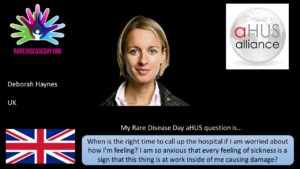Most who have had an encounter with aHUS will be familiar with the anxiety and uncertainty felt by Deborah in her Rare Disease Day video question .

Deborah asks “When is the right time to call up the hospital if I am worried about how I am feeling ? I am so anxious that feeling of sickness is a sign that this thing is at work inside of me causing damage.”
Hers was the most recent patient encounters with the disease, Deborah being merely just six weeks post onset, when the video was published.
aHUS onset feels like a car crash because of the shock of being very seriously ill , sometimes with clinicians puzzled by what was happening and uncertain about diagnosis, something which patients find very frightening not what they expect would happen when they “go to the Doctors “.
Soon the effects of acute renal failure require dialysis something which most think ” only happens to others” and “is this their life from now on if they survive”. The anemia reduces energy and everything becomes an effort in a downward spiral.
Now there is eculizumab, but even that takes time to become effective as dosing regimens are introduced; for adults it is 900mg at weekly intervals until 1200mg is reached at two week intervals ;and complement is brought under control.
Slowly the plummeting blood ” counts ” for platelets and haemoglobin begin to rise as the thrombotic microangiopathy (TMA) is halted. Kidney function starts to increase too; but all of it takes time and nausea is a common effect of kidney injury. All the while the patient is uncertain whether it is all working for them, indeed is aHUS ( or the TMA) still happening? Patients do not feel like they used to.
The advent of eculizumab has also meant that long term hospital stays are less likely, and patients can be released within a few weeks to recover at home; but with regular clinic visits , which in time will become less frequent. It would not be unusual, and indeed advisable as part of the care pathway, to have a helpline telephone number to speak to someone, if only for reassurance . Bother them if it bothers you is what recovered aHUS patients would most likely advise. It is all part of patient engagement.
The fatigue felt is quite natural and understandable , with adults probably feeling it a bit more than children.
The aHUS Registry Scientific Advisory Board has approved two studies of aHUS .
One to examine the patient reported fatigue levels at intervals from that first onset. The other is to look at whether there is any residual TMA reported in patients post treatment; and if so what is the likelihood of it happening ,and, for which patient cohort.
In the next 12 months it may be possible to answer Deborah’s question more comprehensively; but in the meantime there is anecdotal evidence from many aHUS patients that things get better in time with eculizumab.

